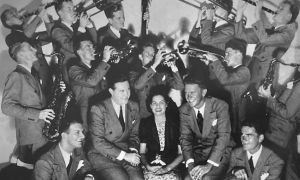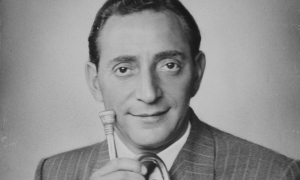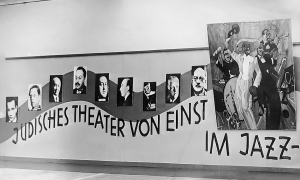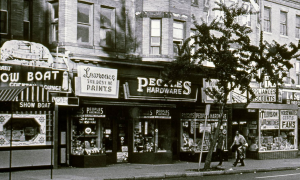Home » Jazz Articles » History of Jazz » Jimmy Zito: Young Man With a Horn
Jimmy Zito: Young Man With a Horn

He had a low tolerance for BS.
—Chuck Findley

Frank Zappa
guitar, electric1940 - 1993
Leonard Feather
b.1914At one time, you would not have had to work particularly hard to find Zito's name in the newspapers, this is the later 1940s and early 1950s. He would have been, as it were, a minor celebrity of the gossip column sort, just as

Nick Travis
trumpet1925 - 1964

Pete Candoli
trumpet1923 - 2008

Conrad Gozzo
trumpet1922 - 1964

Uan Rasey
trumpet1921 - 2011
James Carmen Zito came from a large immigrant family that had settled in Chicago. It would strike you as large by contemporary standards, but it was probably not exceptional as Italian American families went. He had, at minimum, seven living siblings in 1930, in a household that numbered eleven. He lived in a small row house on a quiet, tree lined street, but it must have been crowded. If Jimmy practiced trumpet as a kid, someone got an earful, family, or neighbor. A kid trumpet player's first months on the instrument are usually memorable, no matter how gifted the student may be. Jimmy was certainly gifted, a prodigy even, but no one is born knowing how to play a horn. The story that he played with the Chicago Symphony at 12 or 13 appears to be apocryphal (at least the Symphony can't verify it), but

Herbie Hancock
pianob.1940
In May 1941, "Jimmy Zito, not quite 18 and looked upon [in Chicago] as a veritable hell on trumpet" was playing with Paul Jordan's locally based band. But not for long. By August of the same year, Zito had joined Ted Fio Rito, with whom he briefly played, until no later than 1942 (when he did make a raucous eight-bar appearance on "Ma, He's Making Eyes at Me" in a film with Fio Rito), by which point he had joined

Tommy Dorsey
trombone1905 - 1956
By May of 1942, Zito had joined what

Frank Sinatra
vocals1915 - 1998

Ziggy Elman
trumpet1914 - 1968
Well, a lot of great players in those days were remarkably casual about their horns (

Bunny Berigan
trumpet1908 - 1942

Ziggy Elman
trumpet1914 - 1968
Before going into the military service (the United States entered World War II in December 1941 and there was a draft), Zito seems to have recorded a certain amount with TD. But there is one recording that stood out, if only because we have a clip of it from the late 1943 film "Madame DuBarry was a Lady," and it featured Zito's razzle-dazzle playing with Ziggy Elman on "Well Git It." (Lord knows what Dorsey's band was even doing in the film) TD had previously recorded the

Sy Oliver
arranger1910 - 1988
So, it probably should come as no surprise that writers like Barry Ulanov began to refer to Zito, then all of 20 years old, as a copy of Elman, but this was probably one of the last things he did with TD before going to

Les Brown
composer / conductor1912 - 2001

Doris Day
vocals1922 - 2019
Not that it seemed to matter. In March 1947, Zito took probably his best-known solo with Brown's band, "High on a Windy Trumpet." While for once Brown's band starts to sound a little more modern and even boppish in places, Zito's solo is unreconstructed swing chops that rivaled anything that

Roy Eldridge
trumpet1911 - 1989
The marriage was a disaster, to put it mildly. It lasted slightly more than 2 years. Writing about turbulent relationships is always difficult. You inevitably get mostly one side of the story and Haver had a distinct flair for the dramatic., not to mention short-term commitments (in fairness, her subsequent marriage to Fred MacMurray was a long one). There is a temptation to regard the union as irrelevant, except for the fact suddenly, the whole world (it seemed) knew who Zito was. Hollywood gossip columnists like Louella Parsons saw to that. Even worse, this was the point when Zito left Les Brown and started his own band.
This may not have been a great business move. Even though the band was small—11 pieces—and got basically good reviews even as it was starting out, times were tough economically with the unwinding of World War II. But George Simon called December 1946 the official end of the Big Band era.

Woody Herman
band / ensemble / orchestra1913 - 1987

Benny Goodman
clarinet1909 - 1986

Harry James
trumpet1916 - 1983

Jack Teagarden
trombone1905 - 1964

Benny Carter
saxophone, alto1907 - 2003

Ina Ray Hutton
composer / conductorb.1916
But if you did have a band, you had a payroll, and you had to work. The road called, which did not make for marital bliss. Perhaps the only reason for even mentioning the episode is that

Donn Trenner
piano1927 - 2020
And from 1947 to 1952 Zito was mostly on the road. While the band did occasionally have two-or three-week engagements in venues like Los Angeles, what followed was a seemingly endless round of one nighters, and college proms. Zito was a top post-war "name "band on the college circuit (like his near-contemporary Elliott Lawrence) and did proms and social affairs At UC Berkeley, the University of Washington, Oregon State, and the University of Idaho. Just looking at the band's schedule in 1948 and1949 would make you think twice about the glamorous life of a road musician: one-nighters in Oregon, Idaho, Washington, Montana, Utah, California, Texas. The list was virtually endless.
Moreover, Zito got caught up in the wrangling over the infamous American Federation of Musicians recording ban (1941) which was supposedly over in 1944, but whose lingering effects had caught Zito in a 1948 lawsuit over recordings that he either could not or should not make. If there was any time worse for swing bands than the late 1940s and 1950s, you would have to prove it. In the event, Zito finally gave up, defeated, and rejoined a reconstituted Les Brown band in 1952. He was again a featured soloist, and virtually reprised "I've Got My Love to Keep Me Warm" on "Ramona." He also soloed, or played lead, or some of both on a terrific album, Musical Weather Vane (Coral, 1952), in a bop-inflected trumpet section. In the meantime, he would be married and divorced once again, to a minor Hollywood starlet, Cece Whitney. Her complaint was that Jimmy, apart from being a genius, and hard to live with, was inclined to spend his evenings out playing music. And that was that.
What comes next leads to speculation. Unfortunately. Zito, Lord knows, was not the first great trumpet player to have problems with substance abuse, and he certainly would not be the last. A measure of fame, Hollywood glamor and all the rest, including trying to get a big band going under unpromising circumstances took a toll. Really, in retrospect, he was lucky to have survived. The account of the automobile accident he was involved in in Van Nuys, California in October 1954 was bad. It sounds as if he lost control of a car in a turn, suffered a concussion, a fractured jaw, and a fractured leg. Zito was quoted by police as saying, "I have been drinking for three days but don't know what happened last night. I don't know whether I was in a traffic accident, whether somebody hit me, or whether I hit somebody else. The only thing I remember is when I came to in the garage." Aside from very likely killing him, the accident he had could have easily ended his career if damage to the jaw were severe enough (not just a dramatic ploy in a movie like Mo' Better Blues (1990) He must have been a tough customer, because he had also broken his playing hand at one point previously and kept on right through it.
Zito obviously had an alcohol problem, but since the rest of his career was basically realized as a studio musician—along with the best at the instrument around LA—it is difficult to believe he did not get a handle on it. Any professional will tell you studio calls are often early in the day (trumpeter

Uan Rasey
trumpet1921 - 2011

Bix Beiderbecke
cornet1903 - 1931
Sonny Berman
b.1925
Doug Mettome
trumpet1925 - 1964

Fats Navarro
trumpet1923 - 1950
So it is very interesting that when Zito surfaced again with what must have been a near rendezvous with mortality it was with a studio orchestra (sometimes called a symphony) operated by MGM, in which he played in a section with
Ray Triscari
trumpetSometime, one guesses in 1956, Jimmy joined the house band for the Steve Allen show that ran on NBC. It was directed by Donn Trenner and included players like

Frank Rosolino
trombone1926 - 1978
Bob Enevoldsen
tromboneb.1920

Conte Candoli
trumpet1927 - 2001

Shorty Rogers
trumpet1924 - 1994

Billy May
composer / conductor1916 - 2004

Benny Goodman
clarinet1909 - 1986

Al Hibbler
vocals1915 - 2001
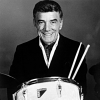
Louie Bellson
drums1924 - 2009

Conrad Gozzo
trumpet1922 - 1964
It had not happened yet, but, in music, as in most fields, there would be a slow changing of the guard. Sure, as late as the 1980s, a lot of the top LA studio musicians and session players would still hold down top jobs, but by the late 1960s, the vanguard would inevitably arrive. It happened with trumpet players, of course, and these people would bring a lot of youthful energy, ears, and drive with them—and a different mindset perhaps, to a physically demanding instrument. You might think of

Chuck Findley
trumpetb.1947
In 1972, The Tonight Show, then hosted by Johnny Carson, moved from New York to California (Burbank, to be precise), and the Tonight Show Orchestra, led by

Doc Severinsen
trumpetb.1927
Skitch Henderson
b.1918
Snooky Young
trumpet1919 - 2011
Doc Severinsen characterized Zito on bass trumpet "[as] one of the greatest sounds you'll ever hear," and once again, Zito went to work with Louie Bellson's big band at Disneyland on bass trumpet, with a feature written for him by Tommy Newsom. The switch obviously worked out for the best, for Zito spent the earlier 1990s gigging around LA, sometimes in the company of trumpeter
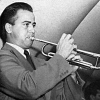
Buddy Childers
trumpet1926 - 2007

Jennifer Leitham
bassAt that point, Jimmy would have been 74, and although he would live to age 90, he seems to have called it day sometime before, although relatives say he continued to play for hours a day. He passed away in 2004 in Woodland Hills, California, where he had long lived, but went to home to Chicago as his final resting place. He had outlived all but one member of his immediate family.
Chuck Findley remarks that his wife, Zelee once called Jimmy Zito "The Oldest Hippy in Town." Chuck observed the Zito "loved to play," something Zito confirmed repeatedly when asked about his life in music. It's very tempting to say you can hear that in virtually everything he recorded, especially when he was cast as a matinee idol early in his career, sort of The Young Man With a Horn (1950), for which he supplied the trumpet background with

Harry James
trumpet1916 - 1983

Gunther Schuller
composer / conductor1925 - 2015
Tags
Comments
PREVIOUS / NEXT
Support All About Jazz
 All About Jazz has been a pillar of jazz since 1995, championing it as an art form and, more importantly, supporting the musicians who make it. Our enduring commitment has made "AAJ" one of the most culturally important websites of its kind, read by hundreds of thousands of fans, musicians and industry figures every month.
All About Jazz has been a pillar of jazz since 1995, championing it as an art form and, more importantly, supporting the musicians who make it. Our enduring commitment has made "AAJ" one of the most culturally important websites of its kind, read by hundreds of thousands of fans, musicians and industry figures every month.
Go Ad Free!
To maintain our platform while developing new means to foster jazz discovery and connectivity, we need your help. You can become a sustaining member for as little as $20 and in return, we'll immediately hide those pesky ads plus provide access to future articles for a full year. This winning combination vastly improves your AAJ experience and allow us to vigorously build on the pioneering work we first started in 1995. So enjoy an ad-free AAJ experience and help us remain a positive beacon for jazz by making a donation today.

Los Angeles
Concert Guide | Venue Guide | Local Businesses
| More...









 Buy Now
Buy Now




